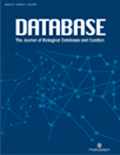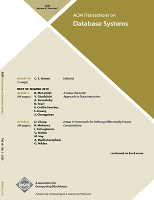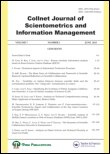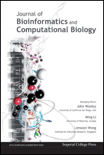
Database-The Journal of Biological Databases and Curation
Scope & Guideline
Pioneering the Future of Biological Database Research
Introduction
Aims and Scopes
- Biological Data Curation:
The journal emphasizes the importance of curating biological data to ensure accuracy, reliability, and accessibility. This includes manual and automated curation processes to enrich databases with validated information. - Integration of Multi-Omics Data:
A core area of focus is the integration of various omics data (genomics, proteomics, metabolomics) to provide comprehensive insights into biological systems and disease mechanisms. - Development of Computational Tools and Databases:
The journal highlights the development of new computational tools, platforms, and databases that facilitate the analysis and interpretation of biological data, including web-based resources and interactive applications. - Machine Learning and AI Applications:
Research often involves applying machine learning and artificial intelligence techniques for data extraction, classification, and prediction in biological contexts. - Knowledge Graphs and Ontologies:
The use of knowledge graphs and ontologies for organizing biological information and enhancing data interoperability is a significant theme, reflecting the journal's commitment to improving data usability.
Trending and Emerging
- Artificial Intelligence and Machine Learning:
Recent publications show a surge in the application of AI and machine learning techniques for tasks such as data extraction, classification, and predictive modeling, highlighting the increasing reliance on computational methods in biological research. - Precision Medicine and Personalized Genomics:
There is an emerging trend towards databases and tools that support precision medicine initiatives, focusing on personalized genomic data and its implications for disease treatment and prevention. - Interactive and Dynamic Databases:
A growing number of studies are focusing on the development of interactive databases that allow users to engage with data dynamically, facilitating better exploration and analysis of biological information. - Integration of Environmental and Microbiome Data:
The intersection of microbiome research and environmental data is gaining traction, reflecting a broader interest in understanding the complex interactions between organisms and their environments. - Collaborative and Community-Driven Databases:
There is an increasing emphasis on the development of collaborative databases that leverage community contributions for curation and annotation, promoting open science and data sharing.
Declining or Waning
- Traditional Database Models:
There has been a noticeable decrease in papers focusing on traditional relational database models, as newer architectures and NoSQL databases gain preference for handling complex biological data. - Basic Data Annotation Techniques:
Papers centered on basic data annotation techniques without the integration of advanced computational methods or AI are becoming less prominent, as the field moves towards more sophisticated approaches. - Generalized Biological Databases:
The publication of generalized biological databases that do not target specific diseases or biological questions appears to be declining, as researchers increasingly focus on niche databases that cater to specialized areas. - Static Data Repositories:
There is a waning interest in static data repositories that lack dynamic features or user interactivity, with a shift towards more engaging and interactive platforms that facilitate user involvement and data exploration.
Similar Journals

Frontiers in Bioinformatics
Connecting Ideas, Driving Innovation in BioinformaticsFrontiers in Bioinformatics is a leading academic journal dedicated to advancing the field of bioinformatics by publishing high-quality research and review articles. Published by FRONTIERS MEDIA SA, this open-access journal aims to foster innovative research, promote collaborative initiatives, and provide a platform for the dissemination of findings related to computational biology, biostatistics, and the intersection of bioinformatics with other biological disciplines. With a focus on promoting accessibility and visibility of research, Frontiers in Bioinformatics operates under a rigorous peer-review process, ensuring that all published content meets the highest academic standards. The journal has shown a commendable rank across various Scopus categories, including Mathematics, Computational Mathematics, and multiple dimensions of Biochemistry and Molecular Biology, indicating its relevance and impact within the research community. Researchers, professionals, and students will find this journal invaluable for staying abreast of the latest developments and breakthroughs in bioinformatics, enhancing their studies and professional projects.

ACM TRANSACTIONS ON DATABASE SYSTEMS
Fostering Excellence in Database ResearchACM Transactions on Database Systems (ISSN: 0362-5915, E-ISSN: 1557-4644) is a premier journal published by the Association for Computing Machinery, dedicated to advancing the field of database systems. Established in 1976, this influential journal has cultivated a reputation for rigorous research, earning a prestigious Q1 ranking in Information Systems as of 2023. With its strong impact factor and notable Scopus ranking (133 out of 394 in Computer Science), it stands as a vital resource for academics, professionals, and students alike seeking to explore the intricacies of database technology, design, and applications. While the journal follows a subscription model, it remains committed to disseminating key developments and fostering knowledge in the rapidly evolving domain of information systems. With contributions from leading experts in the field, ACM Transactions on Database Systems is essential reading for anyone dedicated to the study and practice of database engineering and management.

Collnet Journal of Scientometrics and Information Management
Fostering Academic Collaboration through High-Quality ResearchCollnet Journal of Scientometrics and Information Management, published by TARU PUBLICATIONS, serves as a pivotal platform for researchers, professionals, and students engaged in the dynamic fields of scientometrics and information management. With a commitment to advancing knowledge in these areas, the journal explores innovative methodologies and emerging trends that impact the evaluation and dissemination of scientific information. Though currently not designated as open access, the journal remains highly regarded for its scholarly contributions, making it an essential resource for those seeking to enhance their understanding of knowledge metrics and information science. By facilitating the exchange of high-quality research and insights, this journal plays a crucial role in fostering academic collaboration and shaping the future discourse in the field.

PLoS Computational Biology
Pioneering the Future of Computational Approaches in BiologyPLoS Computational Biology is a premier open-access journal published by the Public Library of Science, committed to advancing the understanding of complex biological data through computational approaches. Since its inception in 2005, the journal has made significant strides in the fields of Cellular and Molecular Neuroscience, Computational Theory and Mathematics, Ecology, Genetics, and Molecular Biology, achieving a notable Q1 ranking in various categories as of 2023. With an exceptional impact factor and an esteemed ranking—such as Rank #23/176 in Computational Theory and Mathematics—PLoS Computational Biology provides a vital platform for researchers, professionals, and students to disseminate their cutting-edge findings and insights. The journal's open-access model ensures that high-quality research is freely accessible worldwide, fostering collaboration and innovation across disciplines. Located in San Francisco, CA, it serves as a hub for the global scientific community, making it an indispensable resource for anyone at the forefront of computational biology and its diverse applications.

Chem-Bio Informatics Journal
Empowering Researchers to Tackle Complex Biological ChallengesChem-Bio Informatics Journal is a dedicated platform for the dissemination of innovative research in the intersecting realms of biochemistry and computational science. Published by the CHEM-BIO INFORMATICS SOC in Japan, this journal embraces the rapidly evolving field of chemoinformatics and bioinformatics, fostering scholarly communication among researchers, professionals, and students alike. With its ISSN: 1347-6297 and E-ISSN: 1347-0442, the journal continues to enrich the scientific community by offering insights into novel methodologies and applications that bridge chemistry and biology. Although currently positioned in the fourth quartile in the biochemistry category according to Scopus rankings, contributing to this journal provides an invaluable opportunity for authors to showcase impactful findings that could resonate within the field. The journal is particularly committed to supporting interdisciplinary research that addresses complex biological problems through computational modeling and data analysis. By publishing high-quality and peer-reviewed articles, Chem-Bio Informatics Journal aims to enhance the scientific discourse and is poised to become a pivotal resource for advancing the frontiers of biochemistry and molecular biology.

Journal of Bioinformatics and Computational Biology
Exploring the Intersection of Biology and Computer ScienceThe Journal of Bioinformatics and Computational Biology, published by WORLD SCIENTIFIC PUBL CO PTE LTD, serves as a significant platform for disseminating innovative research in the dynamic fields of bioinformatics and computational biology. With an ISSN of 0219-7200 and an E-ISSN of 1757-6334, this journal facilitates the exchange of ideas and advancements from its inception in 2003 and continues to be pivotal through 2024. Despite its classification in the lower quartiles—Q4 in Biochemistry and Q4 in Molecular Biology, along with Q3 in Computer Science Applications—the journal remains a valuable resource for researchers and students alike, as it emphasizes interdisciplinary approaches essential for tackling complex biological problems through computational methods. Located in Singapore, the journal encourages submissions of high-quality, peer-reviewed articles that offer insights into computational techniques that empower biological research. Although this journal does not offer open access options, its contributions to research are increasingly recognized across various academic platforms. As the field evolves rapidly, this journal continues to attract a growing readership, making it an essential reference point for anyone interested in the intersection of biology and computer science.

Earth System Science Data
Advancing Earth Science through Open DataEarth System Science Data, published by COPERNICUS GESELLSCHAFT MBH, is a premier open access journal dedicated to advancing the field of Earth and planetary sciences. With an impressive impact factor, it holds a distinguished Q1 ranking in the Earth and Planetary Sciences category, underscoring its significance within the scientific community. Established in 2009, the journal has been committed to providing a platform for the dissemination of high-quality, freely accessible research data that supports the understanding and management of Earth's complex systems. The journal welcomes contributions that offer extensive datasets, innovative methodologies, and collaborations that push the frontiers of Earth sciences, making it an essential resource for researchers, professionals, and students alike. Based in Göttingen, Germany, Earth System Science Data remains a vital asset for those seeking to engage with and contribute to impactful scientific discourse across the globe.

JOURNAL OF BIOMEDICAL INFORMATICS
Advancing healthcare through innovative informatics.JOURNAL OF BIOMEDICAL INFORMATICS, published by Academic Press Inc. Elsevier Science, is a premier peer-reviewed journal dedicated to the integration of computer science and health informatics to advance the field of biomedical engineering and healthcare. With its ISSN 1532-0464 and E-ISSN 1532-0480, this influential journal has established itself with an impressive impact factor, reflecting its high-quality research contributions. Recognized within the top quartile (Q1) of both Computer Science Applications and Health Informatics for 2023, the journal ranks #135 out of 817 in Computer Science Applications and #25 out of 138 in Health Informatics according to Scopus metrics. Offering open access options, it fosters extensive dissemination and accessibility of groundbreaking research findings to the scientific community. As a scholarly platform from 2001 to 2024, it is engineered to cater to the educational needs of researchers, professionals, and students, promoting innovative studies that bridge the gap between technology and healthcare.

DISTRIBUTED AND PARALLEL DATABASES
Advancing the Frontiers of Database InnovationDistributed and Parallel Databases is a prestigious journal published by Springer, dedicated to advancing the field of database systems and distributed computing. With an ISSN of 0926-8782 and an E-ISSN of 1573-7578, this journal has been a prominent platform for disseminating significant research findings since its inception in 1993. The journal is recognized for its contributions across various dimensions of database technology, notably reflecting in its 2023 Quartile Rankings where it stands at Q3 in Hardware and Architecture and Software, while achieving a commendable Q2 in Information Systems and Management. With Scopus Ranking positioning it within the top half of key categories, the journal plays a crucial role in bridging theoretical and practical aspects of distributed database solutions. Although it does not currently offer open access options, it is widely accessible to institutions, making it an essential resource for researchers, professionals, and students keen on exploring the latest trends and innovations in the realm of distributed and parallel computing.

Bioinformatics Advances
Advancing the Future of Bioinformatics ResearchBioinformatics Advances, published by Oxford University Press, is an esteemed academic journal that serves as a vital platform for the dissemination of innovative research in the rapidly evolving fields of bioinformatics and computational biology. With a promising E-ISSN of 2635-0041, this journal has made significant strides since its inception in 2021, achieving a commendable Q1 ranking in both the Computer Science Applications and Genetics categories, alongside respectable Q2 rankings in Molecular Biology and Structural Biology as of 2023. Though currently not an open-access publication, its critical insights cater to an audience keen on advancing knowledge and technology in genomic studies and data analytics. The journal emphasizes high-quality research and aims to facilitate the integration of computational techniques within biological sciences, making it an essential resource for researchers, professionals, and students alike who seek to stay at the forefront of bioinformatics advancements.